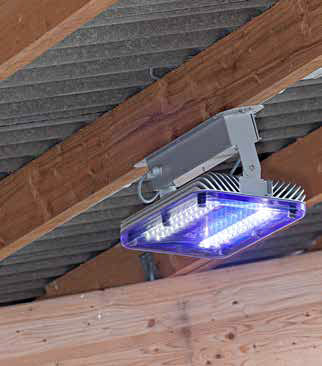The new 140 cow dairy unit at the Lackham campus of Wiltshire College & University Centre has now been operating successfully for more than nine months. The development forms part of a £22 million investment by Swindon and Wiltshire Local Enterprise Partnership (SWLEP) designed to address the rural skills requirements of the future.
T H WHITE and DeLaval have partnered with the College to equip the unit with the latest dairy technologies including two DeLaval VMS robotic milking units for everyday milking of the cows and a third one used for training students. The latest hi-tech innovation to be added to the unit is DeLaval’s LED lighting.
Farm Manager Philip Steans explains: “Dairy farmers have known for a long time that giving cows more light increases milk yield. Studies have shown that exposing lactating cows to 16 hours of light each day will cause the pineal gland to produce less melatonin, in turn leading to increased feed intake and milk production. The uplift can be between 5% and 16% – averaging 8% – so it’s an increase well worth having.”
A consistent duration of 16 to 18 hours of light is needed in each ‘photoperiod’ for the best yields, but it’s also important that the cows should be allowed a 6 to 8 hour period of darkness between the cycles to sustain the response.
 Until recently the energy cost of providing the necessary illumination made the economics questionable, but LED lighting has changed all that. However, says Phil, it’s no good just using any LED lighting: “Cows see a different part of the visible spectrum compared to humans so it’s important not only to achieve the correct brightness, but also the right spread and colour temperature. By combining energy efficient blue LEDs with additional optical lenses, DeLaval has produced cow lighting units that deliver an even ‘bat wing’ spread of light.”
Until recently the energy cost of providing the necessary illumination made the economics questionable, but LED lighting has changed all that. However, says Phil, it’s no good just using any LED lighting: “Cows see a different part of the visible spectrum compared to humans so it’s important not only to achieve the correct brightness, but also the right spread and colour temperature. By combining energy efficient blue LEDs with additional optical lenses, DeLaval has produced cow lighting units that deliver an even ‘bat wing’ spread of light.”
The really clever part is that the DeLaval units deliver light at three different levels – ‘Herd Light’ for the cows’ eyes, ‘Work Light’ for farmers’ eyes, and ‘Night Light’ for the 8-hour dark period when the cows rest but farmers still need to work safely. By ‘switching off’ the light that the cows can’t see and implementing automatic dimming as natural light levels increase, power consumption can be reduced by up to 75 per cent.
The new installation at Lackham has proved the yield benefits resulting from controlled ‘photoperiod’ lighting and the College is playing a key role in introducing these new technologies to the next generation of dairy farmers. If you would like to discuss how you can enhance the production of your herd by switching to this bright idea, just speak to your T H WHITE Dairy rep or call our branches at Frome (01373 465941) or Huntley (01452 830303).
For more information on the Lackham Dairy Engineering Course, or to apply for a place, go to www.wiltshire.ac.uk.


